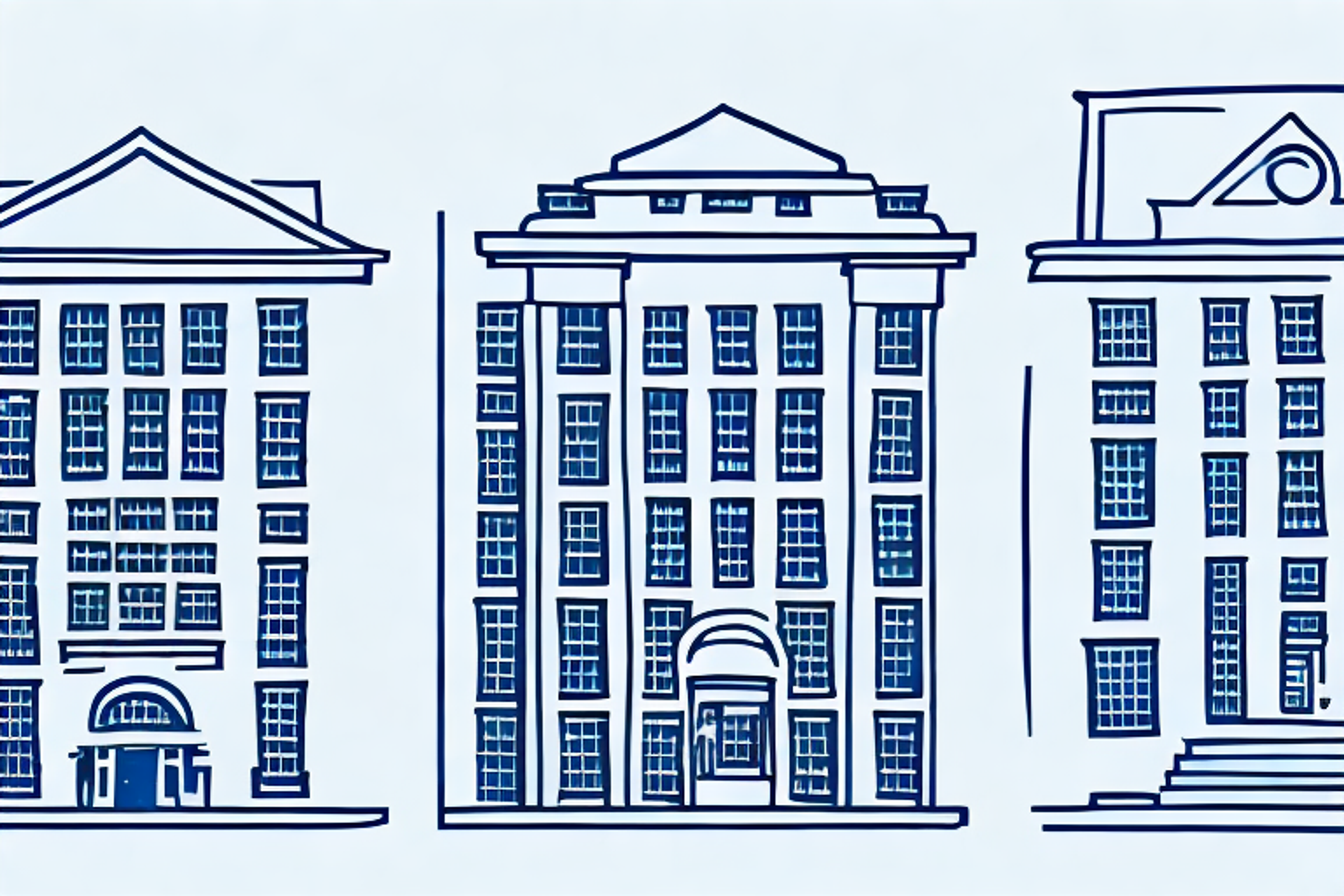University of California--Berkeley School of Law Vs. University of Michigan--Ann Arbor Law School: An In-Depth Comparison
Discover the key differences between the University of California--Berkeley School of Law and the University of Michigan--Ann Arbor Law School in this comprehensive comparison.
Posted March 6, 2025

Table of Contents
Choosing the right law school is a major decision for prospective students, and it's important to weigh the options and consider all the factors before making a choice. In this in-depth comparison, we will take a closer look at two top-ranked law schools in the United States: the University of California--Berkeley School of Law and the University of Michigan--Ann Arbor Law School.
Location and Campus Environment: A Comparison
The location and campus environment of a law school can have a significant impact on the student experience. Berkeley Law is located in the vibrant city of Berkeley, California, which is known for its diverse community, cultural events, and outdoor activities. The campus itself is located on a hill, with stunning views of the San Francisco Bay area.
On the other hand, Michigan Law is located in Ann Arbor, Michigan, a college town with a strong emphasis on academics and research. The campus is surrounded by trees and green spaces, creating a serene and peaceful environment for students.
Admissions Requirements and Application Process: How Do They Compare?
The admissions requirements and application process for both law schools are similar. They both require undergraduate transcripts, LSAT scores, letters of recommendation, and a personal statement. However, Berkeley Law also offers an optional "Why Berkeley Law" essay, which gives applicants the chance to express their interest in the school.
Michigan Law has a holistic approach to admissions and takes into account a wide range of factors, including the applicant's background, work experience, and interests. Both schools have competitive acceptance rates, with Berkeley Law boasting a rate of 14% and Michigan Law boasting a rate of 23%.
Faculty and Staff: A Comparative Analysis
The faculty and staff at both law schools are highly respected and accomplished in their fields. Berkeley Law has 98 tenure-track faculty members, including several Nobel laureates and MacArthur Fellowship recipients. Michigan Law has 80 full-time faculty members, many of whom have served as judges, scholars, and policy makers in their areas of expertise.
Curriculum and Course Offerings: Which School Comes Out on Top?
The curriculum and course offerings at both law schools are designed to provide students with a strong foundation in legal theory and practice. Berkeley Law offers a range of courses in areas such as environmental law, intellectual property, and international law, and also has a robust clinical program where students can gain practical skills through hands-on experience.
Michigan Law also has a wide range of course offerings and offers several specialized programs, including the Environmental Law and Policy Program, the International Taxation Program, and the Human Rights Initiative. Both schools offer opportunities for students to participate in moot court and mock trial competitions.
Student Life and Extracurricular Activities: A Comprehensive Comparison
Both law schools have active and engaged student bodies, with a wide range of extracurricular activities and organizations available for students to participate in. Berkeley Law has over 90 student-led organizations, including the Berkeley Journal of Gender, Law & Justice and the Boalt Environmental Law Society. Michigan Law has over 60 student organizations, including the Michigan Journal of Environmental & Administrative Law and the Black Law Students Association.
Both schools also have vibrant social scenes, with events such as mixers, bar reviews, and intramural sports. However, due to the differences in location and campus environment, the nature of the social scenes is somewhat different at each school.
Career Opportunities and Employment Rates: Which School Offers Better Prospects?
The ultimate goal for most law students is to secure a good job after graduation. Both Berkeley Law and Michigan Law have excellent career services offices that provide students with resources and guidance in their job search. Berkeley Law has a very strong reputation in the Bay Area legal market, with many graduates going on to work in top law firms and government agencies in the region.
Michigan Law has a reputation for producing graduates who are well-prepared for a wide range of legal careers, including private practice, government service, and public interest work. Both schools have high employment rates for their graduates, with Berkeley Law reporting a rate of 87.5% and Michigan Law reporting a rate of 91.1%.
Tuition Fees and Financial Aid: A Cost Comparison
The cost of attending law school is a major factor for many students, and both Berkeley Law and Michigan Law are considered to be relatively expensive. Berkeley Law currently charges $54,247 per year for tuition and fees, while Michigan Law charges $61,350 per year.
Both schools offer a range of financial aid options, including scholarships and grants, work-study programs, and student loans. Berkeley Law has a generous financial aid program and provides aid to over 70% of its students, while Michigan Law provides aid to around 68% of its students.
Alumni Networks and Support Services: How Do They Measure Up?
The alumni networks and support services at both law schools are extensive and well-connected. Berkeley Law has a very active and engaged alumni network, with over 15,000 alumni worldwide. The school also has a range of support services for students, including counseling and wellness programs, academic support, and career guidance.
Michigan Law also has a strong alumni network, with over 20,000 alumni worldwide. The school provides a wide range of support services for students, including academic support, career counseling, and networking events.
Rankings and Reputation: Which School Holds the Edge?
Both Berkeley Law and Michigan Law are highly ranked and well-regarded law schools. According to the US News & World Report rankings, Berkeley Law is currently ranked #10 in the nation, while Michigan Law is ranked #7.
Both schools have a reputation for academic rigor, intellectual vitality, and social responsibility, and are well-known for producing successful and influential graduates.
Student Reviews and Feedback : What do the Students have to Say?
Student reviews and feedback can provide valuable insight into the student experience at a law school. Both Berkeley Law and Michigan Law have received positive reviews from current and former students, with many praising the quality of the faculty, the rigor of the curriculum, and the sense of community and support among students.
However, there have also been some criticisms of both schools, particularly around issues of diversity and inclusion. Some students have reported feeling marginalized or excluded from certain aspects of campus life, and both schools have ongoing efforts to address these concerns.
Research Centers and Institutes : A Comparative Study
Both Berkeley Law and Michigan Law are home to a number of research centers and institutes focused on a wide range of legal issues. Berkeley Law has over 20 centers and institutes, including the Berkeley Center for Law and Technology, the Center for Law, Energy & the Environment, and the Institute for Legal Research.
Michigan Law also has a range of centers and institutes, including the Center for International and Comparative Law, the Center for the Study of Complex Systems, and the Human Trafficking Clinic.
Bar Exam Passing Rates : Which School Has a Better Track Record?
Passing the bar exam is a critical milestone for law students, and both Berkeley Law and Michigan Law have strong track records in this regard. According to data from the American Bar Association, the overall pass rate for first-time takers of the California bar exam in 2020 was 77.4%, while the pass rate for first-time takers of the Michigan bar exam was 78.9%.
International Programs and Partnerships : How Do They Compare?
Both Berkeley Law and Michigan Law have robust international programs and partnerships, aimed at providing students with opportunities to study and work abroad. Berkeley Law has partnerships with over 50 law schools in 27 countries, and offers a range of study abroad programs as well as international internships and externships.
Michigan Law also has a wide range of international programs and partnerships, including study abroad opportunities, foreign exchange programs, and summer internships. The school also has a strong focus on global legal education and offers a number of courses and programs related to international law.
Campus Safety Measures : A Comparative Overview
Campus safety is a critical concern for most students and their families, and both Berkeley Law and Michigan Law have implemented various measures to ensure the safety and well-being of their students. Berkeley Law has a full-time security staff that patrols the campus and provides escort services at night. The school also has an emergency notification system in place in the event of a crisis or incident.
Michigan Law also takes campus safety seriously, and employs a team of trained security personnel to monitor the campus. The school also has a range of safety procedures and protocols in place, including an emergency alert system, a crime prevention program, and a Campus Safety Task Force.
Technology Infrastructure : A Comparative Analysis
Technology plays an increasingly important role in legal education, and both Berkeley Law and Michigan Law have invested in state-of-the-art technology infrastructure to support their students and faculty. Berkeley Law has a range of technology resources available to students, including a student computing center, a law library with online resources, and access to a range of legal databases.
Michigan Law also has a strong focus on technology, and boasts an extensive library of electronic resources, as well as a range of tools and platforms to support student learning and collaboration.
Diversity, Equity, and Inclusion Initiatives : How Do They Measure Up?
Diversity, equity, and inclusion are important values for both Berkeley Law and Michigan Law, and both schools have implemented various initiatives aimed at promoting these values on their campuses. Berkeley Law has a range of diversity programs and initiatives, including student-led affinity groups, a diversity and inclusion task force, and an Office of Equity and Inclusion.
Michigan Law also has a strong commitment to diversity, equity, and inclusion, and has implemented a range of initiatives and programs, including a Diversity, Equity, and Inclusion Action Plan, a diversity ambassador program, and a range of affinity groups.
Future Plans and Developments : What's in Store for These Law Schools?
Both Berkeley Law and Michigan Law are constantly evolving and adapting to the changing landscape of legal education and practice. Berkeley Law has several ongoing initiatives and plans, including a new academic building, a strategic plan for diversity and inclusion, and a focus on innovation and entrepreneurship in the legal field.
Michigan Law is also focused on innovation and has a range of new initiatives in the pipeline, including a new program in Legal Analytics and a focus on interdisciplinary education and research. The school also recently unveiled a new Strategic Plan aimed at enhancing the student experience, promoting diversity and inclusion, and strengthening the school's reputation as a leader in legal education.
In conclusion, the decision to attend law school is a major one, and requires careful consideration and research. Both Berkeley Law and Michigan Law are highly respected and top-ranked law schools, and each has its own unique strengths and advantages. By examining the various factors discussed in this comparison, prospective students can make an informed decision about which school is the best fit for their goals and aspirations.











